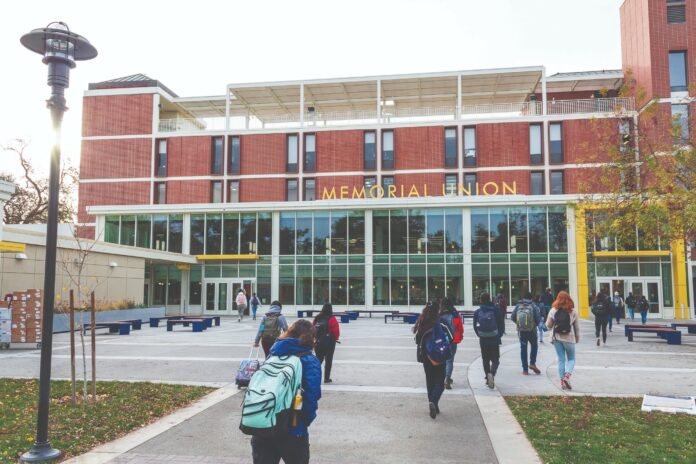After historically low voter turnout in fall elections, ASUCD and student organizations emphasize the importance of voter participation, competitive elections to increase representation
By LILY FREEMAN – campus@theaggie.org
The ASUCD 2023 spring elections are near; students will be able to cast their votes on the ASUCD elections website from the morning of April 24 to the evening of April 28. Undergraduate students will vote for various candidates running for ASUCD leadership positions, including the roles of senator, president and vice president, external affairs vice president, student advocate and international student representative.
Students will also vote on proposed measures. Senator Stephen Fujimoto explained some of the measures that will appear on the ballot.
“An amendment I authored will be on the ballot, CA #79 or the ‘DRIP II Amendment,’” Fujimoto said. “The Senate will also be voting on whether to put The Green Initiative Fund [TGIF] fee referendum on the ballot.”
According to Fujimoto, the DRIP II Amendment would allow the student body to vote on a recall and a replacement candidate for an ASUCD senator, external affairs vice president, student advocate, transfer student representative or an international student representative at the same time.
If the Senate decides to put TGIF on the ballot, it will mark the third election in a row that it has been voted on by students, after failing during the past two elections due to a lack of voter turnout. A 20% voter turnout is required for any measure on student fees to pass.
Cassie Eng, a fourth-year managerial economics and environmental policy analysis and planning double major and a TGIF committee member, described why she believes the TGIF referendum is important.
“TGIF supports the UC Davis reputation as a global leader in sustainability and climate change research,” Eng said. “Given historically low voter turnout, we are really pushing for the student body to make the spring elections count.”
Kelly Abey, a third-year environmental policy analysis and planning and sustainable environmental design double major and a TGIF committee member, explained what is at stake if TGIF does not pass during this election.
“TGIF is operating on the last of our reserves,” Abey said. “If we fail for a third time, the program will no longer exist on the UC Davis campus. We are planning on doing all that we can to increase the undergraduate voter turnout to meet the 20% voter threshold.”
In March, the Editorial Board met with Chancellor Gary May and other UC Davis administrators. At the meeting, we asked whether the administration would financially support the continuation of TGIF and its related operations, should it fail to pass in the ASUCD elections. May said that “there are funds available […] that could address this issue” but that nothing has been done at this point.
Fujimoto said that all proposed measures will be finalized and published on the elections website in the upcoming weeks so that students can learn about them before voting.
Voting will take place digitally through the ASUCD elections website, but the ASUCD Elections Committee is also working on setting up in-person voting booths with volunteers who will assist in teaching students how to vote, according to Fujimoto. ASUCD will announce where students can find these booths once the locations are finalized.
Students who are interested in running for an ASUCD leadership position can sign up for a ticket until 8 a.m. on April 10. To become a candidate, according to the elections website, undergraduate students must be in good academic standing. Additionally, candidates running for Senate, transfer student representative, international student representative and student advocate must obtain 50 student signatures. The external affairs vice president must obtain 70 signatures and executive tickets must obtain 150 signatures.
Fujimoto encouraged students to run and emphasized the importance of competitive elections.
“ASUCD elected officials get to have a say on a variety of things that impact students, including how ASUCD services are run and how the ASUCD fee revenue is spent,” Fujimoto said. “While knowledge and experience in ASUCD are useful, much of it can be taught if you are open to learning. A willingness to listen to students and a desire to advocate for them can’t be taught and is so much more important. Any student who has that willingness and desire should run even if they are remotely considering it.”
Reid Rizk, a second-year international relations major and ASUCD elections officer, also outlined the influence of this election.
“This election, and ASUCD elections overall, are extremely important to our campus and the students who live here,” Rizk said. “After several cycles of less than ideal turnout and engagement, the elections committee believes in promoting fair and free elections with a wide field of candidates for office and providing students with the ability to advocate for policies and people they want to lead our school.”
Sign up for a ticket to become a candidate in the spring elections here. Learn about the election candidates here and the election measures here. Cast your vote here. (Polls open on April 24 at 8 a.m. and close on April 28 at 8 p.m.)
Written by: Lily Freeman — campus@theaggie.org










